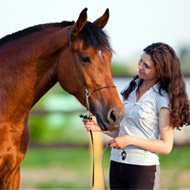Horses ‘read and remember’ human facial expressions

This is the first time it has been shown that horses can remember emotional experiences with specific individuals.
Horses have the ability to read and remember human facial expressions, new research has shown for the first time.
Domestic horses were shown a photograph of a happy or angry human face, before seeing the actual person several hours later, now in a neutral emotional state.
According to findings published in Current Biology, the direction of the horses’ gaze revealed that they perceived the person more negatively if they had seen them looking angry in a photograph.
Importantly, the humans did not know which photographs the horses had seen, to prevent them behaving differently when they met the horses. The differences in the horses’ reactions only applied to the people they saw in the photographs.
Although previous research has found horses can recognise human facial expressions, this is the first time it has been shown that they can remember emotional experiences with specific individuals.
Study co-author Dr Leanne Proops, from the University of Portsmouth, said: "We know that horses are socially intelligent animals, but this is the first time any mammal has been shown to have this particular ability.
“What's very striking is that this happened after just briefly viewing a photograph of the person with a particular emotional expression – they did not have a strongly positive or negative experience with the person."



 RCVS Knowledge has welcomed Professor Peter Cockcroft as editor-in-chief for Veterinary Evidence.
RCVS Knowledge has welcomed Professor Peter Cockcroft as editor-in-chief for Veterinary Evidence.